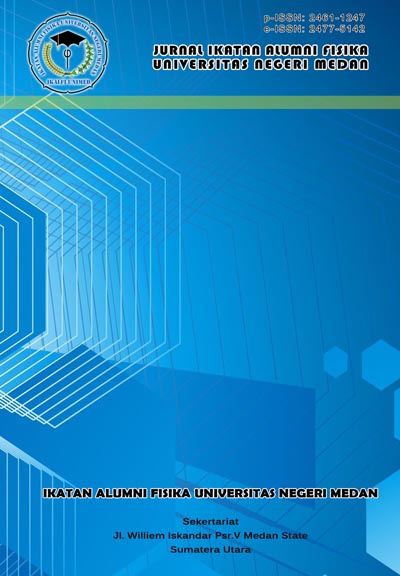PENGARUH MODEL PROBLEM BASED LEARNING TERHADAP KETERAMPILAN MEMECAHKAN MASALAH AUTENTIK SISWA PADA MATERI POKOK HUKUM NEWTON KELAS X SEMESTER I SMA NEGERI 1 SEI SUKA T.A 2016/2017
DOI:
https://doi.org/10.24114/jiaf.v4i2.10889Keywords:
Learning with Model Problem Based Learning, Learning outcomes, ActivitiesAbstract
This study aims to determine the effect of learning model Effects of Problem Based Learning Model Against Authentic Problem Solving Skills Students On Main Material Newton's Law Class X Semester Sma Negeri 1 Sei Suka T.A 2016/2017. This research is a quasi-experimental. The population in the study were all students of class X Semester SMA N 1 Sei Suka consisting of 5 classes. Sampling was done by cluster random sampling by taking two classes of fifth grade were randomly ie class X MIA 2 as an experimental class of 40 persons and class X MIA 3 as the control classes of 40 people. The instrument used to determine student learning outcomes is the achievement test in the form of essay test with the number of 10 questions. Based on the analysis of data obtained pretest and posttest results of both classes of normally distributed and come from a homogenous group. Postes results obtained an average grade experiment using the model of Problem Based Learning at 83.65 with a standard deviation of 7.98 and in the control group gained an average post-test score of students at 70.95 with a standard deviation of 8.62. Postes data normality test results for an experimental class obtained Lhitung <Ltabel 0.1246 <0.1401, while for grade control Lhitung <Ltabel 0.0438 <0.1401 thus concluded that the data postes of both classes of normally distributed.References
Arends, Richard I. 2008. Learning To Teach Edisi Ketujuh Buku Dua. Yogyakarta : Pustaka Belajar
Arikunto, S. 2009. Dasar- Dasar Evaluasi Pendidikan. Jakarta : Bumi Aksara
Arikunto, S. 2010. Prosedur Penelitian. Jakarta : Penerbit Rineka Cipta
Gustika, D. 2013. Pengaruh Model Pembelajaran Berbasis Masalah Terhadap Hasil Belajar Siswa Pada Materi Hukum Newton di Kelas X Semester I SMA Negeri 1 Labuhan Deli T.P. 2015/2016. Medan : Fmipa Unimed
Djamarah, S. dan Aswan, Z. 2013. Strategi Belajar Mengajar. Jakarta : Rineka Cipta
Gredler, Margaret E. 2011. Learning and Instructions. Jakarta : Kencana.
Hillman, W. 2003. Learning How to Learn : Problem Based Learning. Vol. 28 Issue 2
Istarani. 2012. 58 Model Pembelajaran Inovatif. Medan : Media Persada
Kanginan, M. 2006. FISIKA untuk SMA Kelas X. Jakarta : Erlangga.
Latunussa, I. 1988. Penelitian Pendidikan Suatu Pengantar. Jakarta : P2LPTK
Masek, A and Yamin, S. 2012. The Impact of InstructionalMethods on Critical Thinking: A Comparison of Problem-Based Learning and Conventional
Approach in Engineering Education. Volume 2012, Article ID 759241, 6 pages
Mardiana, Irawati, M. H, dan Sueb. 2016. Pembelajaran Berbasis Masalah (Problem Based Learning) Sebagai Upaya Meningkatkan Hasil Belajar Kognitif
Margono, S. 2007. Metodologi Penelitian Pendidikan. Jakarta:Rineka Cipta
Nursita, Darsikin, dan Syamsu. 2014. Pengaruh Model Pembelajaran Berbasis Masalah Terhadap Kemampuan Pemecahan Masalah Hukum Newton pada Siswa Kelas X SMA Negeri 4 Palu. Vol. 3 No. 2, Jurnal Pendidikan Fisika
Polya, G .1973. How to Solve It A New Aspect Of Mathematcal Method. New Jersey : Princeton University Press Priceton
Rogers. 1992. Penyusunan Penskoran Dan Penggunaan Tes Prestasi Belajar
Sagala, S. 2009. Konsep dan Makna Pembelajaran. Bandung : Alfabeta
Sanjaya, W. 2006. Strategi Pembelajaran Berorientasi Standar Proses Pendidikan. Bandung : Kencana Prenada Media Group
Sardiman. 2011. Interaksi dan Motivasi Belajar Mengajar. Jakarta : PT Raja Grafindo Persada
Slameto. 2010. Belajar dan Faktor-Faktor yang Mempengaruhinya. Jakarta : Rineka Cipta
Sudjana. 2005. Metode Statistika. Bandung : Tarsito
Trianto. 2009. Mendesain Model Pembelajaran Inovatif-Progresif:Konsep, Landasan dan implementasinya pada Kurikulum Tingkat Satuan Pendidikan. Jakarta : Penerbit Kencana
Trianto. 2010. Mendesain Model Pembelajaran Inovatif-Progresif. Jakarta: Kencana
Downloads
Published
Issue
Section
License
Copyright (c) 2018 JURNAL IKATAN ALUMNI FISIKA

This work is licensed under a Creative Commons Attribution 4.0 International License.
Authors who publish with this journal agree to the following terms:- Authors retain copyright and grant the journal right of first publication with the work simultaneously licensed under a Creative Commons Attribution License that allows others to share the work with an acknowledgement of the work's authorship and initial publication in this journal.
- Authors are able to enter into separate, additional contractual arrangements for the non-exclusive distribution of the journal's published version of the work (e.g., post it to an institutional repository or publish it in a book), with an acknowledgement of its initial publication in this journal.
- Authors are permitted and encouraged to post their work online (e.g., in institutional repositories or on their website) prior to and during the submission process, as it can lead to productive exchanges, as well as earlier and greater citation of published work (See The Effect of Open Access).

